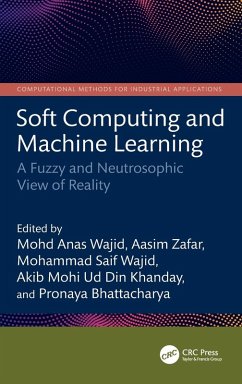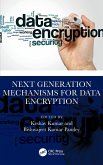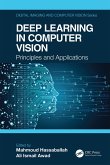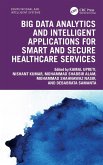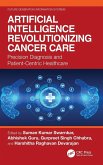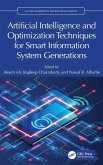Soft Computing and Machine Learning
A Fuzzy and Neutrosophic View of Reality
Herausgeber: Wajid, Mohd Anas; Wajid, Mohammad Saif; Zafar, Aasim
Soft Computing and Machine Learning
A Fuzzy and Neutrosophic View of Reality
Herausgeber: Wajid, Mohd Anas; Wajid, Mohammad Saif; Zafar, Aasim
- Gebundenes Buch
- Merkliste
- Auf die Merkliste
- Bewerten Bewerten
- Teilen
- Produkt teilen
- Produkterinnerung
- Produkterinnerung
This reference text covers the theory and applications of soft computing and machine learning and presents readers with the intelligent fuzzy and neutrosophic rules that require situations where classical modeling approaches cannot be utilized, such as when there is incomplete, unclear, or imprecise information at hand or inadequate data.
Andere Kunden interessierten sich auch für
![Next Generation Mechanisms for Data Encryption Next Generation Mechanisms for Data Encryption]() Next Generation Mechanisms for Data Encryption164,99 €
Next Generation Mechanisms for Data Encryption164,99 €![Deep Learning in Computer Vision Deep Learning in Computer Vision]() Deep Learning in Computer Vision106,99 €
Deep Learning in Computer Vision106,99 €![Artificial Intelligence and Communication Techniques in Industry 5.0 Artificial Intelligence and Communication Techniques in Industry 5.0]() Artificial Intelligence and Communication Techniques in Industry 5.0192,99 €
Artificial Intelligence and Communication Techniques in Industry 5.0192,99 €![Optimization and Computing using Intelligent Data-Driven Approaches for Decision-Making Optimization and Computing using Intelligent Data-Driven Approaches for Decision-Making]() Optimization and Computing using Intelligent Data-Driven Approaches for Decision-Making193,99 €
Optimization and Computing using Intelligent Data-Driven Approaches for Decision-Making193,99 €![Big Data Analytics and Intelligent Applications for Smart and Secure Healthcare Services Big Data Analytics and Intelligent Applications for Smart and Secure Healthcare Services]() Big Data Analytics and Intelligent Applications for Smart and Secure Healthcare Services163,99 €
Big Data Analytics and Intelligent Applications for Smart and Secure Healthcare Services163,99 €![Artificial Intelligence Revolutionizing Cancer Care Artificial Intelligence Revolutionizing Cancer Care]() Artificial Intelligence Revolutionizing Cancer Care164,99 €
Artificial Intelligence Revolutionizing Cancer Care164,99 €![Artificial Intelligence and Optimization Techniques for Smart Information System Generations Artificial Intelligence and Optimization Techniques for Smart Information System Generations]() Artificial Intelligence and Optimization Techniques for Smart Information System Generations193,99 €
Artificial Intelligence and Optimization Techniques for Smart Information System Generations193,99 €-
-
-
This reference text covers the theory and applications of soft computing and machine learning and presents readers with the intelligent fuzzy and neutrosophic rules that require situations where classical modeling approaches cannot be utilized, such as when there is incomplete, unclear, or imprecise information at hand or inadequate data.
Produktdetails
- Produktdetails
- Verlag: Taylor & Francis Ltd (Sales)
- Seitenzahl: 310
- Erscheinungstermin: 28. April 2025
- Englisch
- Abmessung: 234mm x 156mm x 19mm
- Gewicht: 630g
- ISBN-13: 9781032746326
- ISBN-10: 1032746327
- Artikelnr.: 72108879
- Herstellerkennzeichnung
- Libri GmbH
- Europaallee 1
- 36244 Bad Hersfeld
- gpsr@libri.de
- Verlag: Taylor & Francis Ltd (Sales)
- Seitenzahl: 310
- Erscheinungstermin: 28. April 2025
- Englisch
- Abmessung: 234mm x 156mm x 19mm
- Gewicht: 630g
- ISBN-13: 9781032746326
- ISBN-10: 1032746327
- Artikelnr.: 72108879
- Herstellerkennzeichnung
- Libri GmbH
- Europaallee 1
- 36244 Bad Hersfeld
- gpsr@libri.de
Mohd Anas Wajid is a Postdoctoral Research Associate in Data Science at the Institute for the Future of Education, TEC de Monterrey, Mexico. He is also Assistant Professor at Galgotias University, Greater Noida, India, in the Department of Computer Science and Application. He received his PhD degree in Computer Science from Aligarh Muslim University, India. He was awarded with the MITACS- SICI Globalink Research Award by Mitacs in collaboration with HRD ministry, Government of India to do a project at the University of Athabasca, Edmonton, Alberta, Canada. ACM India Council named him an ACM India Anveshan Setu Fellow, and he received a fellowship to conduct a part of his research at IIIT- Delhi. He was also a recipient of Maulana Azad National Fellowship (SRF) from UGC, Government of India. He qualified various prestigious national exams such as UGC- NET and GATE multiple times. His contribution to Neutrosophic research earned him a Diploma from the Neutrosophic Science International Association (NSIA), University of New Mexico, United States (USA). He has several research papers to his credit in refereed journals and conferences of international repute such as Journal of Cloud Computing, Nature Scientific Reports, Journal of Computational Intelligence & Neuroscience, and Neutrosophic Sets & Systems, etc. He has co-authored one book and two patents. He has keen interest in Soft Computing, Machine Learning, Data Science, Information Retrieval, and Neutrosophy. He has academic as well as industrial experience. Prof. Aasim Zafar is a Senior Professor at Computer Science Department, Aligarh Muslim University, Aligarh, India. He holds a master's in computer science and applications and obtained the degree of PhD in Computer Science from Aligarh Muslim University, Aligarh, India. His research areas and special interests include Mobile Ad hoc and Sensor Networks, Software Engineering, Information Retrieval, E-Systems, e-Security, Virtual Learning Environment, Neuro-Fuzzy and Soft Computing, Knowledge Management Systems and Web Mining. His areas of teaching interest include Computer Networks, Network Security, Software Engineering, E-Systems, Database Management Systems and Computer Programming. He has presented many papers in National and International Conferences and published various research papers in jour-nals of international repute. Mohammad Saif Wajid received bachelor's degree in computer science and engineering from Dr. A.P.J. Abdul Kalam Technical University, India, and Master's Degree from BBD University, India. He received his Full-Time PhD degree from Tecnologico de Monterrey, Monterrey Campus, Mexico. He also worked as a Visiting Research Scholar at the University of Texas, San Antonio, USA. For the past eight years, he has been working as an Assistant Professor in Computer Science and Engineering and worked as a Software Engineer for a year in India. His research jumps around the potential applications of Digital Twin, Knowledge Graph, Machine Learning, Computer Vision, NLP, and Neutrosophy, touching areas such as Violence Detection, Healthcare Systems, Dense Captioning of images/videos, and DTWIN for Smart cities. He is passionate about digital learning, real- time and asynchronous, and an early adopter of emerging software and hardware solutions to facilitate teaching and research. His other favored tool is LaTeX, which he likes to use for all academic writings and presentations. He has published over 25 research papers in international journals, conferences, and one book. He has supervised eight master's thesis. Akib Mohi Ud Din Khanday has completed his PhD from Department of Computer Sciences, Baba Ghulam Shah Badshah University, Rajouri, India. He has received his master's degree in information technology from Islamic University of Science and Technology, Jammu and Kashmir, India. The author has qualified UGC-NET (December 2020) in Computer Science and Applications. He has worked as an Assistant Professor in PG Department of Information Technology, Cluster University Srinagar for the year 2022. He is currently associated with United Arab Emirates University Al Ain, UAE as a post-doctoral researcher. His research interests are Computational Social Sciences, Computations for Social Good, NLP and Machine/Deep Learning. He has authored many research arti-cles in the reputed journals indexed in SCOPUS and Web of Science. He has presented his work in many international conferences. His research has been cited by many researchers around the Globe. He has served as a reviewer in reputed journals over the years like Scientific Reports, Journal of Social Science and Humanities, IEEE Access, Processes, etc. He has also served as the TPC member of various reputed International Conferences. Pronaya Bhattacharya is currently employed as an Associate Professor in the Department of Computer Science and Engineering, Amity School of Engineering and Technology and Research and Innovation Cell, Amity University, Kolkata, West Bengal, India. He completed his PhD in Optical Networks from Dr. A. P. J Abdul Kalam Technical University in 2021. He has over ten years of teaching experience and 2 years of Industrial experience. He has authored or co-authored more than 110 research papers in leading SCI/SCIE journals and top core IEEE COMSOC A* conferences. Some of his top-notch findings are published in reputed SCI journals. He has an H-index of 22 and an i10-index of 46 as per Google Scholar. His research interests include healthcare analytics, optical switching and networking, federated learning, blockchain, and the IoT. Four of his works on COVID-19 have been added by the World Health Organization (WHO) in its research database for the technical novelty of proposed solutions which orients the societal aspect. He has been granted three international patents in the fields of healthcare, blockchain, and network communications. He has been appointed in the capacity of a Keynote Speaker, Technical Committee Member, Program Chair, and the Session Chair across the globe. He was awarded nine best paper awards in Springer ICRIC-2019, IEEE-ICIEM-2021, IEEE- ECAI-2021, Springer COMS2-2021, and IEEE-ICIEM-2022. He has three interna-tionally granted patents to his credit. He is a Reviewer of 25 reputed SCI journals, such as IEEE Internet of Things Journal, IEEE Transactions on Industrial Informatics, IEEE Transactions of Vehicular Technology, IEEE Journal of Biomedical and Health Informatics, IEEE Access, IEEE Network, ETT, IJCS, MTAP, OSN, WPC, and others.
1. Enhancing the Performance of Power Amplifiers by Leveraging on Fuzzy
Logic Techniques. 2. Neutrosophic Cognitive Maps: Theoretical and
Mathematical Formulations, Literature Review and Applications. 3. Every
aspect of Handling Class Imbalance in the Healthcare Sector. 4.
Introduction to Neutrosophic Logic in the Narrow Sense. 5. Machine Learning
vs. Neutrosophic Machine Learning. 6. A case study on the use of the fuzzy
MOORA approach in University Selection. 7. Multi-criteria Feature Selection
Evaluation for Multi-Label Text Classification: Hesitant Fuzzy Geometric
approach. 8. Smart Home Automated Face Recognition. 9. Estimating the
Population Mean Under Non Responses Using Neutrosophic Statistic Tools. 10.
Revolutionizing Data Analytics: The Cutting-Edge Role of Soft Computing
Techniques. 11. AI-Infused Respiratory Diagnostics: A New Era in
Healthcare. 12. Intersection of Neutrosophy and Machine Learning:
Applications in Agriculture. 13. Newfangled Methods for Interval
Neutrosophic Sets. 14. Synthesis of Machine Learning Applications
Cutting-Edge Modern Agriculture: Projecting Fuzzy Logic Crop Health
Monitoring via Soil and Plant Sensors Technologies.
Logic Techniques. 2. Neutrosophic Cognitive Maps: Theoretical and
Mathematical Formulations, Literature Review and Applications. 3. Every
aspect of Handling Class Imbalance in the Healthcare Sector. 4.
Introduction to Neutrosophic Logic in the Narrow Sense. 5. Machine Learning
vs. Neutrosophic Machine Learning. 6. A case study on the use of the fuzzy
MOORA approach in University Selection. 7. Multi-criteria Feature Selection
Evaluation for Multi-Label Text Classification: Hesitant Fuzzy Geometric
approach. 8. Smart Home Automated Face Recognition. 9. Estimating the
Population Mean Under Non Responses Using Neutrosophic Statistic Tools. 10.
Revolutionizing Data Analytics: The Cutting-Edge Role of Soft Computing
Techniques. 11. AI-Infused Respiratory Diagnostics: A New Era in
Healthcare. 12. Intersection of Neutrosophy and Machine Learning:
Applications in Agriculture. 13. Newfangled Methods for Interval
Neutrosophic Sets. 14. Synthesis of Machine Learning Applications
Cutting-Edge Modern Agriculture: Projecting Fuzzy Logic Crop Health
Monitoring via Soil and Plant Sensors Technologies.
1. Enhancing the Performance of Power Amplifiers by Leveraging on Fuzzy
Logic Techniques. 2. Neutrosophic Cognitive Maps: Theoretical and
Mathematical Formulations, Literature Review and Applications. 3. Every
aspect of Handling Class Imbalance in the Healthcare Sector. 4.
Introduction to Neutrosophic Logic in the Narrow Sense. 5. Machine Learning
vs. Neutrosophic Machine Learning. 6. A case study on the use of the fuzzy
MOORA approach in University Selection. 7. Multi-criteria Feature Selection
Evaluation for Multi-Label Text Classification: Hesitant Fuzzy Geometric
approach. 8. Smart Home Automated Face Recognition. 9. Estimating the
Population Mean Under Non Responses Using Neutrosophic Statistic Tools. 10.
Revolutionizing Data Analytics: The Cutting-Edge Role of Soft Computing
Techniques. 11. AI-Infused Respiratory Diagnostics: A New Era in
Healthcare. 12. Intersection of Neutrosophy and Machine Learning:
Applications in Agriculture. 13. Newfangled Methods for Interval
Neutrosophic Sets. 14. Synthesis of Machine Learning Applications
Cutting-Edge Modern Agriculture: Projecting Fuzzy Logic Crop Health
Monitoring via Soil and Plant Sensors Technologies.
Logic Techniques. 2. Neutrosophic Cognitive Maps: Theoretical and
Mathematical Formulations, Literature Review and Applications. 3. Every
aspect of Handling Class Imbalance in the Healthcare Sector. 4.
Introduction to Neutrosophic Logic in the Narrow Sense. 5. Machine Learning
vs. Neutrosophic Machine Learning. 6. A case study on the use of the fuzzy
MOORA approach in University Selection. 7. Multi-criteria Feature Selection
Evaluation for Multi-Label Text Classification: Hesitant Fuzzy Geometric
approach. 8. Smart Home Automated Face Recognition. 9. Estimating the
Population Mean Under Non Responses Using Neutrosophic Statistic Tools. 10.
Revolutionizing Data Analytics: The Cutting-Edge Role of Soft Computing
Techniques. 11. AI-Infused Respiratory Diagnostics: A New Era in
Healthcare. 12. Intersection of Neutrosophy and Machine Learning:
Applications in Agriculture. 13. Newfangled Methods for Interval
Neutrosophic Sets. 14. Synthesis of Machine Learning Applications
Cutting-Edge Modern Agriculture: Projecting Fuzzy Logic Crop Health
Monitoring via Soil and Plant Sensors Technologies.

